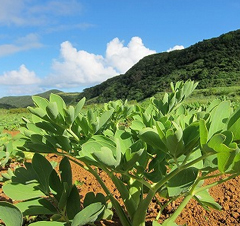Production of peucedanum japonicum up eight-fold in the last five years

Peucedanum japonicum on Yonaguni Island.
July 21, 2012 Maki Nagamine of Ryukyu Shimpo
The volume of production is increasing of peucedanum japonicum, or the longevity herb, a Yonaguni Island herb long known to have medicinal properties. From 2005 to 2010, annual production in Okinawa has grown 8.1 times to 26.6 tons, and the area harvested has increased 4.5 times to 25.4 hectares. In the background to this sharp rise is the fact that Yonaguni, which supplies 95% of the production in Okinawa, developed its production system thanks to budget provided by the national government and the fact that they have made the herb available as a raw material to Shiseido, a major cosmetics company in Tokyo. It is expected that following on from turmeric and aloe, the herb will go on to become another significant medicinal crop for Okinawa.
In 2005, hoping to become a production hub for prefectural-certified agricultural, forestry and fisheries items, the Yonaguni local authorities established a production area council for peucedanum japonicum comprising local government officials, farmers and members of the Japan Agricultural Cooperatives. This has served to strengthen links among producers, manufacturers and distributors and status as a prefectural-certified area of hub production was granted in 2006.
In 2010, they set up a producer-manufacturer’s agricultural group called the Yonaguni Herb Farm using the national fund for revitalizing mountain, agricultural and fishing communities, and launched the Yonaguni Producer Association for peucedanum japonicum. These activities all combined to help establish a stable production system.
As a result, the annual production of the herb in Okinawa in 2005 of 3.3 tons had increased to 26.6 tons by 2010. The area harvested also surged from 5.6 hectares to 25.4 hectares and production is now approaching the 2009 levels of the other medicinal crops in Okinawa of turmeric, 55.1 tons, and aloe, 34.2 tons.
A spokesperson for the Yonaguni Industry Promotion Division, where the council headquarters are located, commented, “To prevent the unwelcome effects of agricultural chemicals and to improve the herb’s quality we will build fences in situations where we plant the trees between sugarcane farms.”
Shiseido is marketing health foods made solely from Yonaguni’s peucedanum japonicum as the Shiseido Longevity Herb in the three forms of tablets, a drink and a powder. Sales from this April to June increased about 40% over the same period the previous year. They decided upon the production volume after discussing the quantity needed each year with the council, thereby helping to secure a stable income for the local farmers.
During fiscal 2005 to 2011, the number of farmers in Yonaguni also grew by 13 families to a total of 50 families and the production value grew by about 2.5 million yen to about 33.1 million yen.
A spokesperson for Shiseido said, “As the volume of sales increase, more raw materials will be required in the future. We want to promote the Longevity Herb brand.”
(English translation by T&CT, Lima Tokumori and Mark Ealey)
Previous Article:Japan Alcohol Corporation starts ethanol production in Miyako
Next Article:Pupils of Kaneshi Elementary School work under professionals to create models of their dream shop
[Similar Articles]
- Pumpkin production revives
- The western-most cillantro production site Yonaguni attracts fans
- Okinawan sea grapes become a brand product
- JA Okinawa begins shipping citrus tankan Hayata to locations throughout the country
- Aquaculture production of estuary cod worth 120 million yen

 Webcam(Kokusai Street)
Webcam(Kokusai Street)


